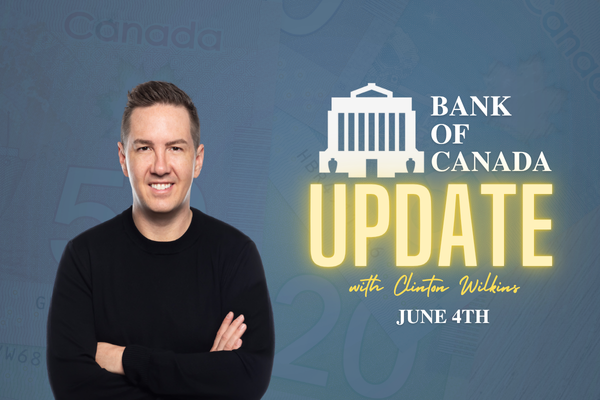Clinton Wilkins joins Todd Veinotte on 95.7 News Radio to discuss The Bank of Canada holding its key policy rate at 2.75%, marking the first pause after seven consecutive cuts.
Global News Morning – rates for average Atlantic Canadians | June 6, 2022
Clinton Wilkins met up with Global News Morning Host Alyse Hand to talk about the Bank of Canada rate increase, and rates for average Atlantic Canadians. Find out if you should stay the course in a variable rate, or convert to a fixed, and what the summer market looks like for first-time home buyers.
Don’t feel like watching the video? Check out the transcript below.
Transcript:
Bank of Canada interest rate up 50 basis points
Alyse Hand: [00:00:00:02] As most of us know by now, the Bank of Canada increased its policy interest rate by 50 basis points at the start of this month. Now, fixed rates for lenders are still higher than variable rates. And according to many lenders out there, it’s not likely rates will negatively impact our housing market like we are seeing across this country.
So lots of questions about this rate hike and what it means for the average Atlantic Canadian. So let’s get some of those answers this morning from Clinton Wilkins, mortgage broker with CENTUM Home Lenders Ltd. Clinton You haven’t been in our studio since before the pandemic.
Clinton Wilkins: [00:00:33:07] I know this is like a homecoming, Alyse. Thanks for having me this morning.
What does this mean for the average Atlantic Canadian?
Alyse Hand: [00:00:36:06] It’s great to see you. And there are a lot of questions. I consider myself one of these average Atlantic Canadians, of course, who has all sorts of questions about this rate hike. So good to get some of your time. What does this mean for someone like myself, someone watching this out there this morning, the average consumer, specifically those who have a variable rate on the mortgage.
Clinton Wilkins: [00:00:54:13] The Bank of Canada met last week and they increased their policy rate by 50 basis points, which means half a per cent. So if you’re in a variable rate mortgage or you have a home equity line of credit, or if you have any unsecured debts that are revolving, that are tied to a variable rate, it’s going to become more expensive. So many Canadians who have a variable rate mortgage have an adjustable payment. So what it really means is the payment is going to go up.
Alyse Hand: [00:01:19:14] And by how much, let’s say you own $500,000 home, you’re on a variable rate. What does that look like tangibly per month in terms of how much more you’ll be paying
Clinton Wilkins: [00:01:28:23] The average Canadian that has a mortgage in Halifax, the average mortgage is around $300,000 right now, Alyse. So depending on the amortisation, the payment is going to go up somewhere around $75 a month for those 50 basis points. So, you know, the payment is certainly going to go up. That’s going to impact the bottom line, obviously, for the amount of money that’s going to come out of your bank account.
Variable or fixed: What Clinton recommends
Alyse Hand: [00:01:49:04] What do you say to people who say, I want to go from a variable to a fixed rate in light of these changes by the Bank of Canada? Is that something you suggest?
Clinton Wilkins: [00:01:56:06] Yeah, well, we certainly get a lot of enquiries. Historically, about 60 per cent of Canadians are in a fixed rate. Our clients more in variable. I think it’s just due to the education and awareness that we give every day. If you’re asking me if it’s a right time to convert into a fixed, our opinion is no. I think you really need to stay the course.
Historically, variable rate is lower. Obviously we understand with variable rate mortgages, the payment could go up or down and the rates are going to go up or down. But I think you really need to weather the storm. The economists are saying that over the next 12 to 18 months, we’re going to see more increases from the Bank of Canada. And I really think they kind of set a strong message when they did the last announcement. They’re really telling Canadians to stop spending on consumer goods.
Canadians should start saving
You and I both know groceries have gone up in price. Obviously, the gas prices are going up. So when a Canadian has a variable rate mortgage and their payments going up, I think in some cases that’s a little bit of the least of our worries. Everything else has just become so, so expensive as well.
Many Canadians think that we may be at the target inflation and economists are saying that maybe by the end of next year. So we may start seeing a recession. And if we do, the Bank of Canada will start lowering that key overnight rate to increase spending. So I think it’s a little bit of a wait and see, Alyse. You know, I think if you’re in a variable rate, you need to weather the storm. And right now, a fixed rate is very high.
For those who are in a variable that want to convert into a fixed, you would be converting into a fixed rate somewhere around 5 per cent. So you would really see a big increase in your cost of borrowing. And we believe that obviously the rates are going to come back down. And I think that’s something important to remember.
The rates will continue to go up?
Alyse Hand: [00:03:44:11] You say they’re coming back down, Clinton, but will they go up? And by how much in your in your mind and with what you do for a living day in, day out, how much do you see them going up before they come down again?
Clinton Wilkins: [00:03:54:01] They think the target prime rate is going to be somewhere around 5 per cent. So many people who are in a variable rate mortgage have prime -100, prime -50. So even if the prime rate was at 5 per cent, it still is going to be much cheaper than where the fixed rates are right now. Obviously, there is a storm going on right now and I think the storm is going to continue.
So I think it’s just look in the mirror and look at your other situations. Look at your unsecured debts. And maybe it’s a time that you want to look at maybe improving your financial position because it’s not just the cost of borrowing that’s going up, it’s obviously the cost of everything else that’s going on in our lives as well.
First-time home buyers in the summer market
Alyse Hand: [00:04:36:16] I want to talk while we have you here about the housing market, too. We’ve talked about it non-stop. It feels like for the past two years since this pandemic started almost three years.
This summer, in terms of prices of homes, those looking to buy out there who are just not able to do so, where they would have been able to a few years ago and are not now. Is there any hope this summer, are we going to see those prices come down? Is this all going to work? What the Bank of Canada is setting out to do here?
Clinton Wilkins: [00:05:00:00] I think in in markets like Ontario and Toronto and in B.C. and in Vancouver, they’re starting to see some softening in the price. I think in Halifax, we’re not going to see that, Elise. The challenge is that we have more demand here in Halifax and really across Atlantic Canada than we do supply. And until we can really increase that supply situation, I don’t think that we’re going to even get to a more of a balanced market.
I can say there is some good news, obviously, for people who want to buy a home and for first-time home buyers: There certainly are more listings on the market today than there were even a few weeks ago.
Alyse Hand: [00:05:32:28] Let’s leave it on that positive note for some of those viewers out there who are like, okay, finally, some more stock. Great to have you on the show.
Clinton Wilkins: [00:05:39:20] Thanks for having me.
Alyse Hand: [00:05:40:23] Always such a wealth of knowledge.
If you have any questions, get in touch with us at Clinton Wilkins Mortgage Team! You can call us at (902) 482-2770 or contact us here.


